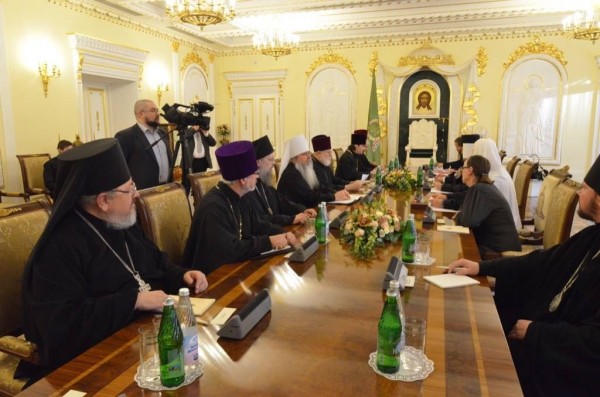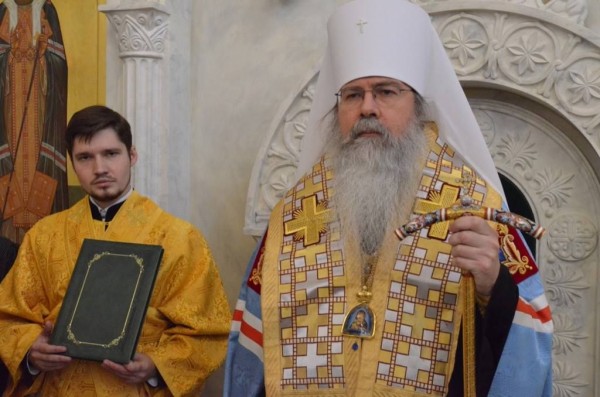After Metropolitan Tikhon presided at the celebration of a Service of Thanksgiving in the Patriarchal Chapel, Patriarch Kirill welcomed him and the members of the OCA delegation.
“I thank you for the prayers and kind words that you have offered on my behalf and on behalf of the small North American delegation that is accompanying me on my first irenic visit to the venerable Church of Russia,” Metropolitan Tikhon said in his response to Patriarch Kirill. “I bring to you the greetings of my brothers on the Holy Synod of Bishops and the prayers of our clergy and faithful throughout North America. The Orthodox Church in America, the youngest among the Orthodox Churches, is always strengthened in spirit by its fraternal relations with the ancient Patriarchates and Churches that faithfully preserve the fullness of the Church and the experience of the Apostles, Martyrs and Saints throughout the ages.”
Metropolitan Tikhon went on to reflect on the close ties between the Church of Russia and the Church in America, recalling the latter’s remembrance of the 220th Anniversary of the arrival of the first Orthodox missionaries in Kodiak, AK in 1794.
[Read the complete text of Metropolitan Tikhon’s greeting below.]
That evening, Metropolitan Tikhon and the OCA delegation visited Spaso House, where they were received by His Excellency, the Honored Ambassador John Tefft, US Ambassador to Russia.
“Let us take advantage of this opportunity to share with one another, to speak with one another and to share the ways in which we might understand one another better and, in the end, learn to love one another, as the Lord teaches us,” Metropolitan Tikhon said in response to Ambassador Tefft’s words of welcome, in which he highlighted the importance of personal contact and exchanges between people and institutions.”
[Read the complete text of Metropolitan Tikhon’s greeting below.]
On Thursday, December 4—the Great Feast of the Entrance of the Mother of God into the Temple—Metropolitan Tikhon and the clergy members of the OCA delegation will concelebrate the Divine Liturgy with Patriarch Kirill in the Kremlin’s historic 16th century Dormition Cathedral.
[A gallery of photos may be found on the OCA web site and Facebook page.
Metropolitan Tikhon’s Greetings to Patriarch Kirill
Danilov Monastery, Moscow
Wednesday, December 3, 2014
Your Holiness:
I thank you for the prayers and kind words that you have offered on my behalf and on behalf of the small North American delegation that is accompanying me on my first Irenic Visit to the venerable Church of Russia. I bring to you the greetings of my brothers on the Holy Synod of Bishops and the prayers of our clergy and faithful throughout North America. The Orthodox Church in America, the youngest among the Orthodox Churches, is always strengthened in spirit by its fraternal relations with the ancient Patriarchates and Churches that faithfully preserve the fullness of the Church and the experience of the Apostles, Martyrs and Saints throughout the ages.
The Church of Russia herself has played an invaluable role in the life of the Orthodox Church in America, from the sending of the first missionary monks from Valaam in 1794 to the granting of autocephaly in 1970. The brotherly support of the Church of Russia continues in our own day and I am truly grateful for the invitation extended by Your Holiness to the Orthodox Church in America for this present visit and humbled to receive the warm hospitality which is so characteristic of Your Holiness and the Church of Russia.
Our present visit is undertaken during the 700th anniversary of the great light of Russian monasticism, Saint Sergius of Radonezh. And this year, we also commemorate the 220th anniversary of the arrival of the Russian monastic missionaries to Alaska who planted the seed of the Holy Orthodox faith in the new world. Since the time of Saint Herman, the monastic labors and evangelical fervor of those holy men have allowed not only the Alaskan lands, but all of North America, to blossom into its present multicultural reality. It was this reality that provided the strong foundation for the growth of Holy Orthodoxy in North America, which now includes a multitude of Orthodox traditions, and not a small number of converts to the Faith.
Another great missionary, who bore a different Cross and lived in a different time, is Saint Tikhon, the Patriarch and Confessor of Moscow and Enlightener of North America. Though he was called to the high office of Patriarch, he never relinquished the humility and meekness of a monastic. In a sermon to his flock in San Fransisco, he spoke of the proper approach to the apostolic work of the Church: “Most importantly,” he said, “the Orthodox Church accomplishes her missionary task in silence, with humility and godliness, with an understanding of human frailty and divine power.”
It is with such an attitude that the Orthodox in North America strives to be faithful to the mission and martyria of the Holy Orthodox Churches around the world, always confessing our unity with them. I am certain that our present visit will be one more opportunity for our two Churches to express our common dedication to missionary outreach, monastic labors and pastoral care for our flocks, and for us to receive Your Holiness’ great love and hospitality.
Once again, I am thankful for the warm expression of love and brotherly solicitude offered by Your Holiness and by the Russian Orthodox Church. I look forward especially to our concelebration of the Divine Liturgy tomorrow for the Feast of the Entrance of the Most Holy Mother of God, and I am thankful for the honor of presiding at the Church of the Great Martyr Catherine, which is celebrating its 20th Anniversary this year as the Representation Church of the Orthodox Church in America. Likewise, I look forward to the opportunity to visit Saint Petersburg and to greet His Eminence, Metropolitan Varsonofy and those with him, as well as to visit the many holy sites and cultural centers included in the full itinerary that has been prepared for us.
I experienced this same hospitality last year for the joyous events celebrating the 1025th Anniversary of the Baptism of Holy Rus’. It was a privilege to be able to serve together with Your Holiness and the most holy Patriarchs and Heads of Delegations of the Orthodox Churches throughout the world for this glorious celebration, and as a testimony to the unity of world Orthodoxy. Although there are occasional obstacles to this unity, it is my conviction that, by the grace of our Lord Jesus Christ, the Source of our unity, we will continue to collaborate together and strengthen the bond of brotherly love among the Churches in our complex global context.
The challenges facing world Orthodoxy are no less present in North America. The Holy Synod of Bishops and I remain committed to the work that has been initiated by the Most Holy Patriarchs and Heads of Orthodox Churches to address the question of the canonical normalization of the situation in the so-called diaspora. Although the term “diaspora” has acquired a negative connotation for some, a more positive interpretation could be given. In the words of Metropolitan Anthony of Sourozh, “the vocation of the Church is to bring the Gospel to all creatures, to be like a handful of seed which the Master of the harvest scatters far and wide, so that it brings fruit in all places where even one seed falls.”
The Orthodox Church in America, from the time of the granting of its Autocephaly by the Church of Russia, has labored to minister to people of all these ethnic and cultural traditions, including native Americans and those who have no connection with any tradition in particular. We are thankful for the brotherly prayers and support of the Russian Orthodox Church, which has always defended our existence, sometimes straining her good relations with other Orthodox Churches.
It is my hope that the strong bond of love and fraternity that has been developed over many years will continue to grow as we work together for the strengthening of the Orthodox Faith throughout the world, especially in those areas where Christians face persecution from others or in those areas, such as North America, where the challenges of modernity and a secular culture threaten the faith of our people. It is also my hope that we will be able to address, both today at this meeting and in the future, areas of mutual concern for our two Churches, and that we will continue to strengthen our fraternal relations as we address these challenges and strive to fulfill the Apostolic mandate, given to us by our Lord Jesus Christ, to “make disciples of all nations.”
Metropolitan Tikhon’s Greetings to Ambassador John Tefft
Spaso House, Moscow
December 4, 2014
I would like to express my deep appreciation and thanks to His Excellency, the honored Ambassador John Tefft and his wife Mariella, for the hospitality they have provided to our humble delegation from the Orthodox Church in America and to all the honored guests who have gathered this evening.
I am thankful to His Holiness, Patriarch Kirill for his invitation to make my first official visit, as the Head of the Orthodox Church in America, to the Orthodox Church of Russia. I am pleased that the conclusion of our delegation’s first full day of pilgrimage is taking place here at Spaso House. It is a great blessing to be with you, and we are overjoyed to share your company.
I was pleased to be in Russia, Ukraine and Belarus last year to participate in the celebrations of the 1025th Anniversary of the Baptism of Rus’. In contrast to this great span of time, the Orthodox Church in America is merely celebrating the 220th Anniversary of the arrival of the Monks and Missionaries who brought the Orthodox Faith to Alaska in 1794.
Nevertheless, in that time, the richness of the religious and cultural heritage that was planted in the New World as a seed has blossomed in many other ways, resulting a rich and diverse Orthodox landscape that reflects the richness and diversity of the people of the North American lands. The Orthodox Church in America includes three dioceses serving Romanians, Bulgarians and Albanians, and all of our parishes include many from other backgrounds, such as Georgians, Ukrainians and Belarusians. Many of our bishops, priests and laity are converts to the faith. [Our own small delegation includes those of Russian, Ukrainian, Canadian, Lithuanian, French and Italian descent.]
In this light, I would wholeheartedly agree with Ambassador Tefft’s words concerning the importance of personal contact and regular exchanges between people and institutions, especially in our increasingly global world. In our own small way, we can contribute to the greater goal of peace and mercy as we gather this evening in Spaso House by the invitation of our generous host. Let us take advantage of this opportunity to share with one another, to speak with one another and to share the ways in which we might understand one another better and, in the end, learn to love one another, as the Lord teaches us.
Thank you for your prayers, and thank you again, Ambassador Tefft, for making this evening possible. I would like to present His Excellency and his wife with this print of an Alaskan Church, similar to the one he visited in Nome, but distinct by its inclusion of native “spirit houses,” a local Aleut pagan custom that was “baptized and transfigured” by the Orthodox natives into an indigenous expression of our universal faith.


















